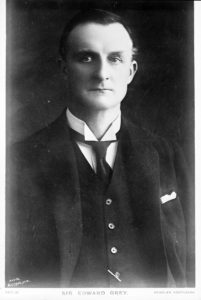March 17, 1913 Arabs Say No to Jewish Homeland – State of Israel
Lowther to Sir E. Grey Ottoman Opposition to Zionism
FO 371/1794 – No. 218 (16925) Pera, March 17, 1913
Sir,
After the coup d’etat of January 23, last by which the Committee of Union and Progress (e.g. COUP) seized power, the Zionists again became active here and the Grand Rabbi of Turkey addressed to the Minister of Justice two notes demanding the abolition of the ‘red passport’ with which non Ottoman Jews have for a decade been obliged to provide themselves on entering Palestine and the removal of the restrictions against the acquisition by Ottoman Jews of larger tracts of land outside the towns and villages in Palestine and against the holding of land within the towns of Palestine by non-Ottoman Jews.
Besides the political reasons which have led the Ottoman Government to oppose Zionism in the form of ‘unrestricted immigration of non-Ottoman Jews into Palestine’, it also felt it necessary to take this course owing to the Opposition of the local Moslem Arabs who on economic grounds objected to the large influx of foreign Jews backed up by subsidies from wealthy Jewish Associations, thus rendering it impossible for the native Arab to compete with the newcomers. Further the Ottoman Government is particularly sensitive in all matters connected with Jerusalem which also contains the Holy Sepulchre and other places to which Christians, and particularly those of the Oriental branch, attach such importance, especially in view of the causes which contributed to the Crimean War. It was consequently alarmed at Zionist projects as set forth by Dr Herzl in his book on the subject styled ‘The Jewish State.’
Dr Max Nordau (e.g. co-founder with theodore herzl of modern zionism) ‘solicits the friendly interest’ of European diplomacy in the matter, but it might be difficult to support projects of the kind without perhaps giving umbrage to the Arabs, and in view of our position in Egypt, H.M.’s Diplomatic Agent and Consul in Cairo, to whom I am forwarding copy of this despatch, would doubtless be better able to judge of the attitude which His Majesty’s Consular offices in Syria and Palestine should adopt in this matter.
Gerard Lowther
Source: Eliav, Mordechai. Britain and the Holy Land 1838-1914. The Magnes Press, Jerusalem 1997 pp. 391-393
